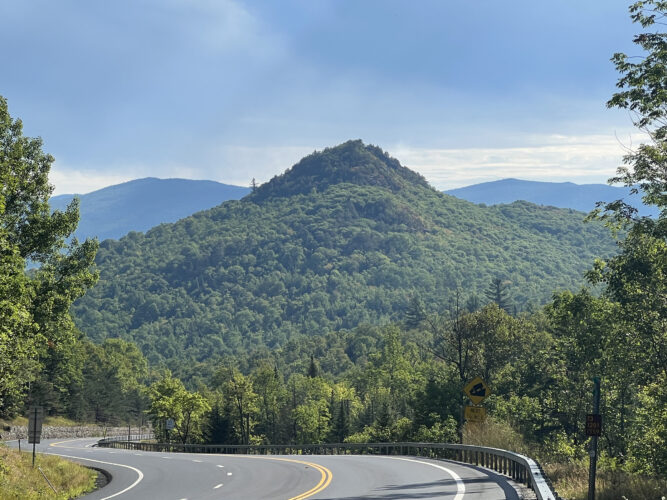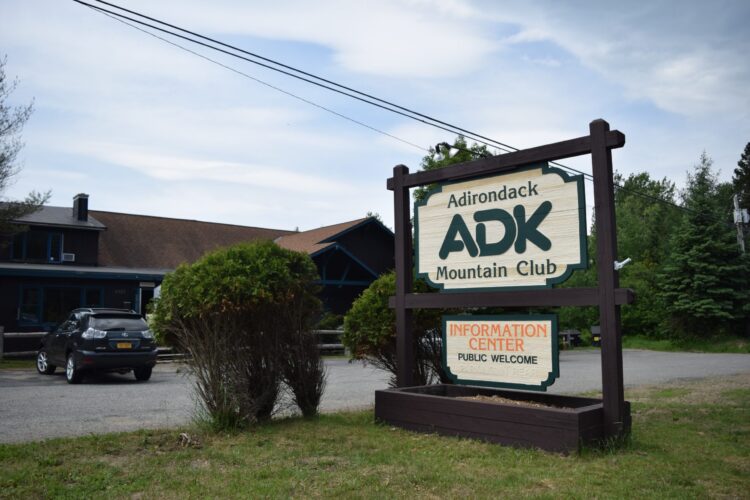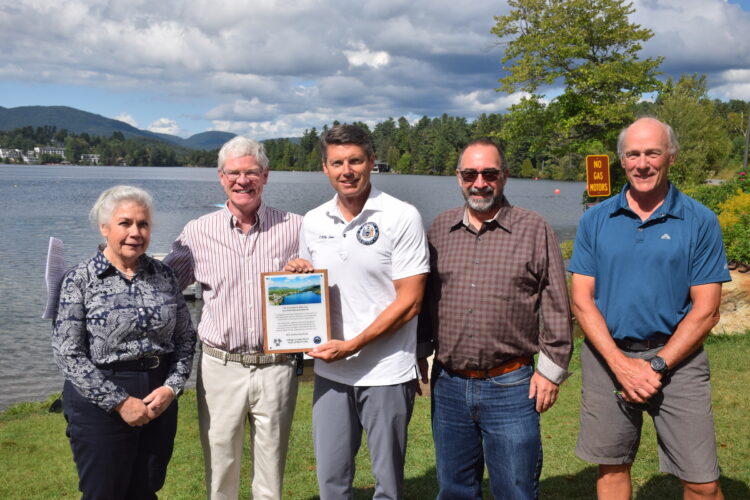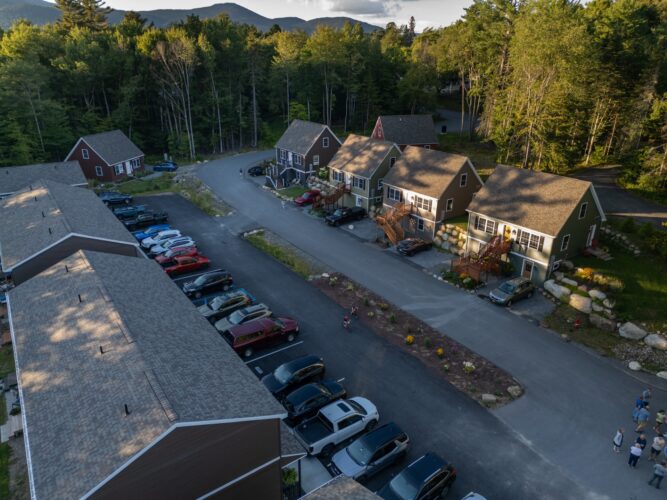Wilmington STR committee suggests new regulations
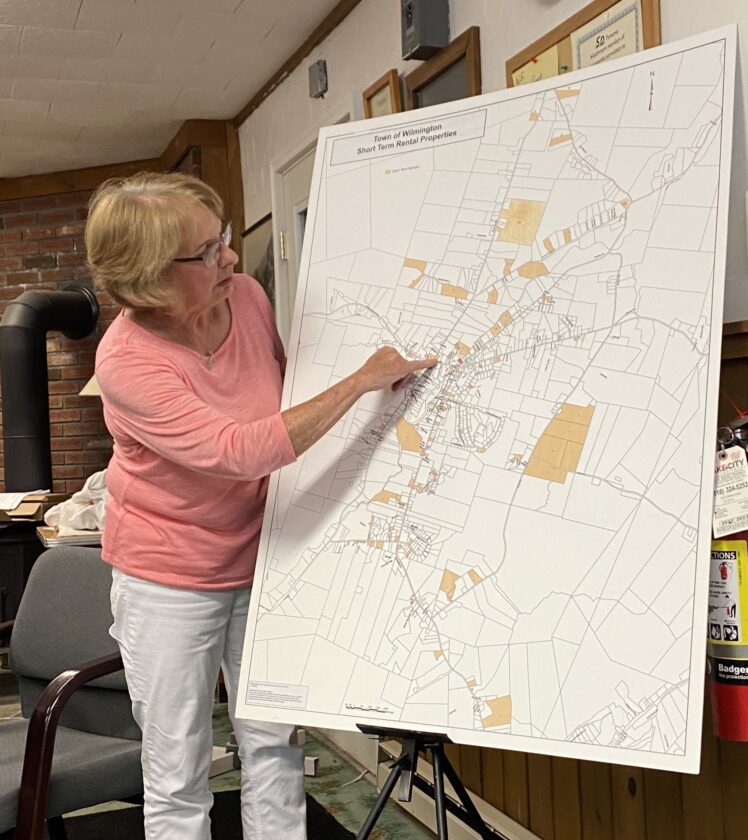
Co-chair of the STR committee Nancy Gonyea gestures at a map of STR properties in the town of Wilmington during a meeting on Wednesday, Aug. 9. (News photo — Sydney Emerson)
WILMINGTON — Wilmington’s short-term vacation rental committee presented its recommendations for new STR regulations, including a suggested cap on the number of permits the town should issue, at a public meeting Wednesday, Aug. 9.
As dusk fell on Whiteface Mountain, concerned citizens of Wilmington packed into the Community Center with notebooks and pencils in hand. The room was full of anticipatory chatter and early arrivals continued to slide down the rows of folding chairs to accommodate the influx of attendees. At exactly 6:29 p.m., the room fell silent.
“How many times has the crowd quieted down before the meeting?” An attendee asked, met with chuckles from the crowd.
Right now, STR owners in Wilmington are required to obtain a STR license from the Town Clerk’s office. But as the STR market here grows,and the region continues to face an affordable housing crisis, some residents have pushed for additional regulations, leading the town board to appoint a committee to research and assemble suggestions. Composed of nine members of the community, the committee presented their suggestions for the town board and gathered feedback from Wilmington citizens during the 75-minute-long meeting.
Co-chair Pat Winch called the meeting to order by describing the purpose of the committee and its suggestions — namely, to “protect neighborhood character and encourage long-term housing” in the town of Wilmington. Committee member Rarilee Conway then shared some demographic information with attendees.
According to the committee’s data, of the 414 households in Wilmington, 120 are STRs, meaning that around a quarter of the houses in town are STRs. Of these 120 STRs, around 80-85% are owned by people who do not live in Wilmington. However, Conway said it’s possible that some of these people live in nearby towns or are seasonal residents. By the committee’s calculations, only 15% of housing in Wilmington is currently geared toward long-term renters, and “the vast majority” of structures currently in use as STRs are viable LTRs.
“How many STRs is too many?” Co-chair Nancy Gonyea asked. “Should there be a cap? We think ‘yes.'”
Gonyea presented a map of STR properties in the town of Wilmington, noting properties at which there are multiple STRs within a single plot. Currently, there are 106 STR sites and 110 STR permits issued in Wilmington. The gap in recorded STR permits and the committee’s 120 recorded STRs is accounted for by “holdouts” who have not sought an STR permit for their STR.
In addition to the STR map on display at the meeting, the committee suggested that Wilmington invest in a geographic information system to keep track of not only STRs but also long-term residences and utilities.
Winch then read the list of suggestions the committee plans to present to the town board. The committee suggests that STR permits should be capped at 120 — the number of STRs currently in Wilmington — and limited to two permits per person. Every STR would need its own permit. The permits would cost $300 annually plus a $50 permit fee and would be non-transferable with property sales, except in the case of a family transferral of property. Current permit procedures would continue for STRs that are attached to residences, such as a cabin or guest house in a residence’s yard. No permit would be necessary for properties rented out less than 30 days annually or for letting out a room in one’s house.
In addition to suggestions, the committee’s plan includes stipulations based on community feedback. The committee is proposing a noise ordinance from 10 p.m. to 7 a.m. and a related ban on fireworks and barking dogs on STR properties in an effort to preserve the peace of neighbors. Additionally, campfires would need to be extinguished by 10 p.m. STRs would have occupancy rules — two guests per bedroom, with an additional two guests allowed in the living area. The property owners would no longer be allowed to let guests park in yards and each property must have either a landline or Wi-Fi available in order for caretakers to contact guests in a timely manner, should a complaint be lodged by neighbors. Yurts, lean-tos and RVs would no longer be allowed to operate as STRs. STR caretakers would need to provide both a property map and a “good neighbor” packet to guests in order to respect neighbors’ privacy and property.
In closing, the committee preempted possible concerns from the community about “government control” or interference. Committee member Stephanie Gates read a closing statement prepared by fellow member David Lally, who was absent from the meeting.
“Do you have a driver’s license?” Lally wrote. “That’s government control.”
His letter proceeded to explain that government control is necessary to prevent “chaos” and concluded by stating that the committee “tried to balance the rights of all involved” as they assembled their suggestions.
As the floor opened up to the public, attendees expressed concerns about the enforceability of some of the committee’s suggestions. The committee clarified that three of their suggestions in particular — the noise ordinance, campfire ordinance and yard parking ordinance — would need to be adopted into local law and apply to all residents of, and properties in, Wilmington, not just STRs. When asked how complaints would be registered and enforced, the committee explained that their proposal includes a system in which neighbors may lodge complaints via telephone, which will then be conveyed to the property’s designated caretaker. The caretaker must address any complaints within an hour. If a caretaker fails to address three enforceable complaints in a timely manner, their STR permit may be revoked.
Additional concerns were raised about the amount of work and administrative costs that yearly renewal of STR permits would generate for Wilmington. The committee countered this concern by reminding attendees that their job is merely to make suggestions to the town board, who then will handle the details of financial feasibility.
Several landlords and STR caretakers present questioned how LTRs could be incentivized by this process, as they believed that the mortgages and maintenance fees on some properties exceed a reasonable monthly rent, making STRs a more viable financial option. The committee felt that incentivization of LTRs would need to happen at the state level and that their main concern in regulating STRs is to preserve the sense of community and local ownership in Wilmington, further suggesting that their non-transferable permit plan will discourage investment portfolios from snapping up properties to use as STRs.
The committee will now take their plan to the town board, which will examine and potentially revise it before consulting with their attorney. From there, the plan will go into public hearings and possibly further revisions before the town board would take a vote to decide whether or not to adopt the regulations.
“It could be a substantially long process,” committee member Mindy Goddeau said.
The meeting concluded at 7:45 p.m. with several attendees expressing their gratitude for the amount of work and dedication the STR committee has done on behalf of the citizens of Wilmington.
“Everyone should have a voice and a vision for Wilmington,” Gonyea said, to nods and applause.
Wilmington is one of many North Country communities weighing STR regulations. The town of North Elba and Village of Lake Placid adopted a placeholder STR law in March 2020, creating a new permit system and establishing safety standards. That law was revised at the start of this year to ban the issuance of new STR permits in residential areas, among other new measures designed to preserve neighborhoods. The village of Saranac Lake also adopted a set of STR regulations in June.

